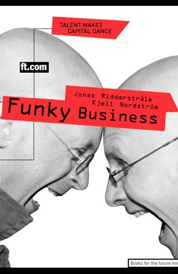Thinkers50, the world's first ranking of management thinkers, ranked Ridderstrale and his colleague Dr. Kjell Nordstrom at number 9 in the world and number one in Europe in 2005.
Jonas' research focuses on new organizational models and leadership styles in the information age, and has been published in leading academic journals, magazines and newspapers - including Business Strategy Review, Organization Science and the Financial Times.
His international best-seller "Funky Business: Talent Makes Capital Dance" (co-authored with Kjell A. Nordsrom) is a manifesto of what our time requires from business firms and their leaders. It has been featured on CNN, CNBC, Fortune, Fast Company, Time Magazine, Financial Times and Paris Match.
Both Amazon.co.uk and Management General rated "Funky Business" as one of the five best business books of 2000, and it was recently ranked at number 16 in a survey of the best business book of all time. Jonas also contributed to the best-selling "Financial Times' Handbook of Management and Business: The Ultimate Resource".
Jonas is assistant professor at the Centre for Advanced Studies in Leadership at the Stockholm School of Economics, where he has run the Advanced Management Program. He is also on the editorial board of The Capstone Business Encyclopedia, and works as an advisor, lecturer and consultant to a number of international corporations.
Jonas has an MBA and a Ph.D from the Stockholm School of Economics. His uncompromising, imaginative and funky take on contemporary business life has made him one of today's most sought after speakers. He was recently recognized as Sweden's outstanding young academic of the year.





